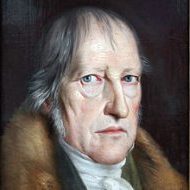- Why are Hegelian texts so difficult to read?
- Which other texts by Hegel are there, which are the best places to start – and how long will it take me to finish reading Hegel?
- For whom was Hegel relevant?
- Why is Hegel still relevant today?
- What does Hegel understand by truth?
- How can “the substance” also be thought of “as a subject”?
- How does Hegel justify his statements?
- Is Hegel’s philosophy a “philosophy of identity”?
- Is Hegel’s philosophy “philosophy of mind/spirit/Geist”?
- Is dialectics real or just a method of presentation?
- Are the moments of a dialectical movement – dualistically – opposed to each other?
- Is Hegel’s “speculative reason” a higher, even mystical faculty?
- Is Hegel’s “reason” that of the solitary thinker?
- Has Hegel become superfluous through hermeneutics?
- What role does “difference” play in Hegel?
- Is Hegel’s system hierarchical?
- How does Hegel feel about empiricism?
- Is the will really free, especially if it is supposed to be rational?
- What conceptual development precedes the philosophy of law?
- Is Hegel an apologist for the “total state”?
- Do we still think like that today?
- Didn’t Hegel simply misunderstand the meaning of the copula?
- Does Hegel underestimate the inherent dynamics/autonomy of the individual areas?
- Is Hegel’s history man-made – or deterministic?
- Isn’t everything in reality unconscious, unreasonable drive?
- Hasn’t Marx finally turned Hegel on his head?
- I am a pragmatist. Why do I need Hegel?
- I am a nihilist. Can I ignore Hegel?
*Not always with answers (yet), but looking for them…
